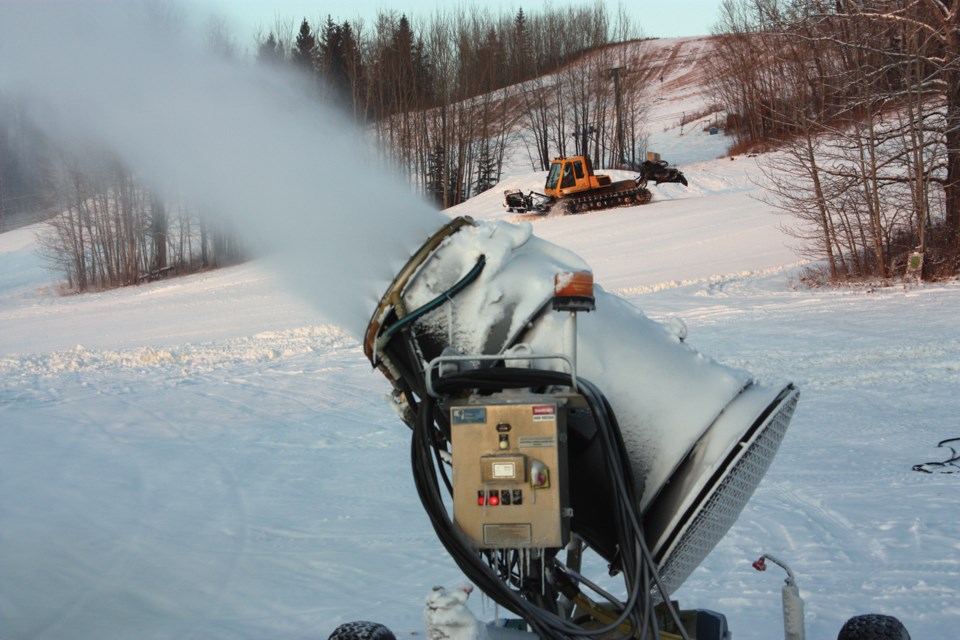WESTLOCK — The Friends of Tawatinaw, who operate the Tawatinaw Valley Ski Hill, have entered into negotiations with Westlock County to extend their contract.
Board members gave council a brief overview of the past three years at the ski hill during an April 20 governance and priorities meeting, before the conversation moved behind closed doors for contract talks.
The number of visitors from Westlock County has gone up 103 per cent since the Friends took over operations — from 1,079 in the 2018/19 season to 2,189 this year. Overall, the total number of visitors has gone up by 74 per cent, from 8,964 three years ago to 15,573 this year.
The 2020/21 numbers do not include school visits because the COVID-19 pandemic that has shut down that program. More skiers from areas south of Westlock have visited this year, in part due to restrictions on other activities and the Edmonton ski hills diverting users north when they can’t accommodate them.
“There’s been a lot of really awesome things happening at the ski hill and this is exciting for the county. From where it started out at and where it is now, wow, it’s a lot of work, a lot of volunteers, and I'd just like to thank you for that. Hats off to you guys,” said reeve Jared Stitsen.
In the public sphere — mostly on social media — the county has been criticized for continuing to pay for a ski hill despite the fact that only 20 per cent of the users are from the Westlock area. Critics refer to this as subsidies for non-residents.
“Actually, the reverse is true,” said Friends board member Colin Felstad. “Most of our costs out at the ski hill are fixed, close to 90 per cent of them. Whether we run that hill with 50 people attending or 500 people, our costs are pretty much the same.”
Felstad added visitors from outside the region “contribute to the revenue of the ski hill, which allows us to run a more competitive ski hill and there’s less costs to the county and local people.”
The county contributes $200,000 in operating funds and $50,000 for capital per year under the current agreement with the Friends of Tawatinaw. On average, it costs about $600,000 annually to operate the hill and most of that comes from user fees and fundraising.
Around 30 to 40 per cent of the yearly expenses go to salaries for the locals they employ, but all board members are volunteers.
President Wendy Batog said over the past three years, the Friends have raised $248,816 in donations for capital projects, not including the $100,000 from the county. In an e-mail, Batog clarified the Friends have not yet collected the $50,000 matching grant for Year 3 from the county.
In 2018, the Westlock Rotary Club donated $75,000 for the rental fleet, and 100 Women Who Care Westlock donated $10,000 for helmets.
The Friends are looking to extend the contract and continue operating the hill. Earlier this year in a separate presentation, they asked for ongoing $200,000 operating contributions from the county, but said they could manage the hill without the $50,000 in capital money.
Felstad said then that it is easier to apply for grants and run fundraisers for specific projects rather than day-to-day operations.
“I think a lot of residents, they see the benefit of having volunteers run the ski hill because you’re able to pull in more money that doesn’t come from the county,” said Coun. Isaac Skuban.
Councillors will discuss this further at a future regular meeting, where they’re likely to make a decision on the operational future of the ski hill. The next meeting is scheduled for April 27.
Some info shouldn’t be in-camera, two councillors say
Coun. Dennis Primeau has continued to be vocally against the county contributing any money to the ski hill, has often cited the chalet as an inescapable expense and has advocated for a potential sale of the land regardless of the price.
Last Tuesday, he, Skuban and deputy reeve Brian Coleman agreed that some of the information councillors were privy to behind closed doors should have been shared with the public.
According to the county’s rec manager, Jessica Toews, the file contained quotes for future capital projects, and financial information, including the ski hill capital plan “with letters of endorsement from other municipalities, private individuals, none of that has had names and email addresses removed out of it.”
Felstad told councillors that financial information for the first two years has already been made public.
“It’s questionable that this stuff should even be in-camera, but that’s where it’s been placed,” Primeau said. “I still cannot see anything in there: personnel, legal, land. There's nothing in there that’s any of those things.
Coleman added: “The discussion itself I understand would be in-camera, but I think the information that’s on this in-camera item would be very valuable to share with the public because I can’t see anything there that could not be shared.”
Skuban wanted to know the reasons why administration placed that particular information in-camera before council made a decision on releasing it publicly.
Coun. Lou Hall and Victor Julyan disagreed: Hall initially proposed they table the conversation until they figure it out, and Julyan said the Friends are “entitled to some protection in this situation” and private, contractual information shouldn’t be shared.
“I think that when it comes time to discuss it in its entirety at a council meeting, everything will be released at that time, but I don’t think we should change it today,” Hall said.
The meeting moved forward only after Coleman suggested they keep the information as it was allocated and release it at the next council meeting.
Admin cited section 24.1, advice from officials, of the Freedom of Information and Protection of Privacy Act, that allows the CAO to refuse disclosure of information that could reveal “positions, plans, procedures, criteria or instructions developed for the purpose of contractual or other negotiations.”



